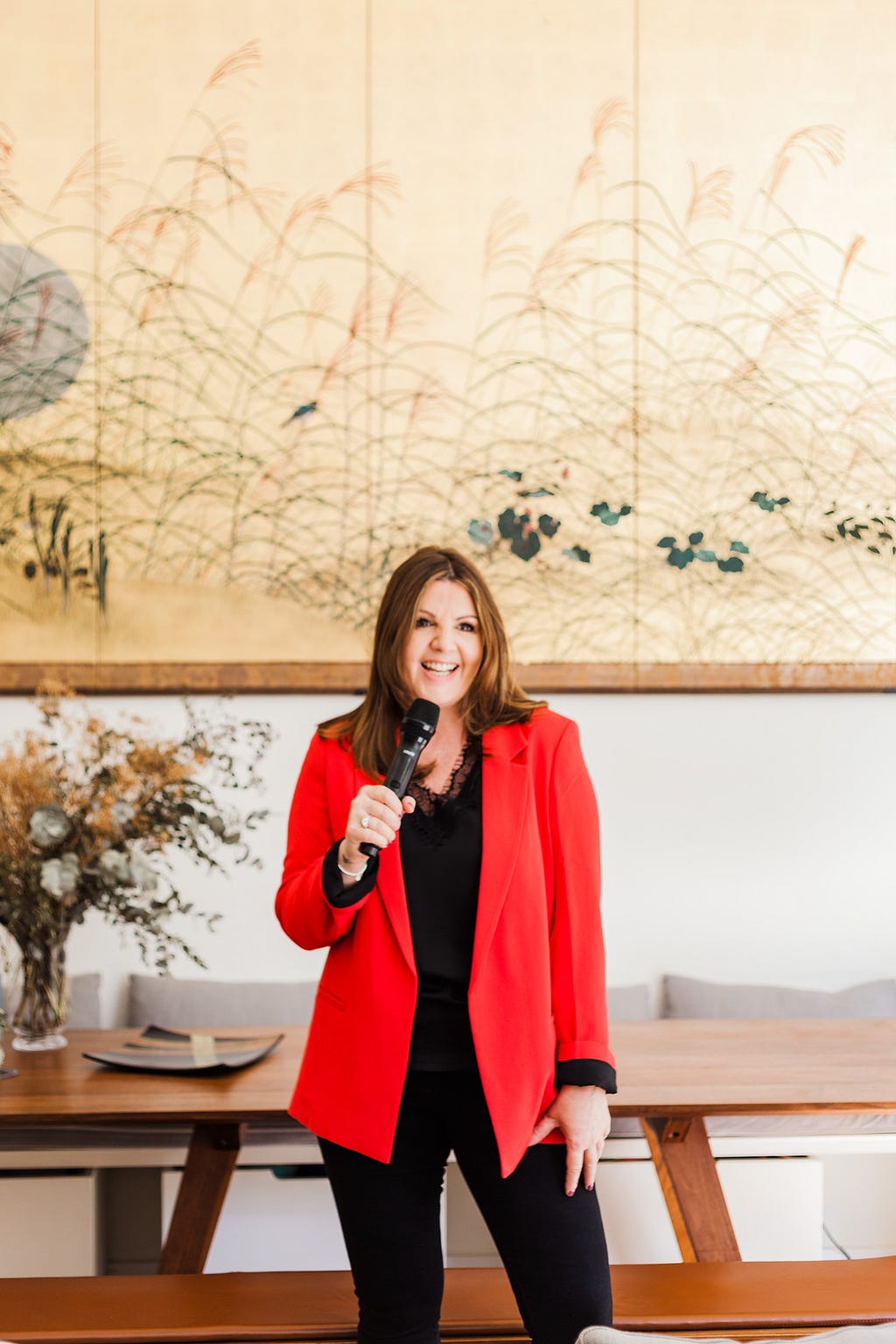An Interview With Candice Georgiadis

I think we all have the ability to become a successful entrepreneur. What it takes is a great amount of resilience, self-awareness, and tenacity. If you have the idea and the passion, then you have what it takes. I see many people, men, and women, have an idea and expect it to become a success overnight. Having a business is a learning process and when things don’t go well it is important to see them as a lesson, not a failure. If you are someone that can keep going then you have what it takes. I find women are incredible at this. They say “if you want a job doing give it to a busy woman” — well I also think that is true of business owners. Women are better with empathy and relationships, and these are key elements to business survival.
As a part of our series about “Why We Need More Women Founders”, I had the pleasure of interviewing Emma Clayton.
Emma Clayton is a driven single mum who took the strategic decision to get into debt so that she could continue to work and progress in her career. With a mortgage to pay there was no option to take a step back and the company wouldn’t allow flexible working. Starting her marketing consultancy business £32,000 in debt, within two and a half years, she had become a leading player in her industry and had grown an established Marketing and Communications agency generating a million pounds in turnover. Emma now helps female entrepreneurs scale and grow their ventures through teams, showing how it’s possible to juggle motherhood with a business and how not to lose their minds, health, or relationships in the process.
Thank you so much for doing this with us! Before we dig in, our readers would like to get to know you a bit more. Can you tell us a bit about your “backstory”? What led you to this particular career path?
I started my own business five years ago with no idea what it took to build one. In the UK where I live, there was no obvious place I could turn for support, skill development and basic knowledge of how to grow a business from scratch. Whilst I did create a seven figure business within three years it was from making and learning from a lot of mistakes as well as successes. I sold that business and now focus my team on supporting other female founders to create a roadmap for success without making the same mistakes that I made.
Can you share the most interesting story that happened to you since you began leading your company?
I think one of the proudest moments for me was when we fired our first client. We realised early in the journey that we shouldn’t say yes to every client and that some wanted to pay us a lot less than the value we delivered, and it was okay to end those relationships. My team were experiencing difficulties with the senior leadership team, and we took action to terminate the relationship. Culture is so important in an organsiation and is driven by all the decisions you do (and don’t) make.
Can you share a story about the funniest mistake you made when you were first starting? Can you tell us what lesson you learned from that?
I don’t think it’s so much funny as embarrassing but the first mistake I made was how low I priced my services. My idea was to make the same money as I made in my job, which is such a common thought process that we have when we leave employment and begin a business. But I forgot that I needed to pay taxes, contribute to my own pension and that my pricing was set by me and not my last organisation. I now work with women leaving corporate life to set strong pricing from the start.
None of us are able to achieve success without some help along the way. Is there a particular person who you are grateful towards who helped get you to where you are? Can you share a story about that?
I am always in the debt of my Operations Director who joined me in the first year of my business. We worked well together and quickly realised how different we were and how we could use that to great effect in the business. We divided up the roles according to our strengths and respected this. It enabled us to cover all the elements in the business with each of us completing tasks we loved. She was very process driven, which I dislike immensely and I was the creative strategist. We were a formidable team. I recommend everyone find someone that is their total opposite to take away the tasks you dislike. It was at that point we started to see huge productivity and growth.
Ok, thank you for that. Let’s now jump to the primary focus of our interview. According to this EY report, only about 20 percent of funded companies have women founders. This reflects great historical progress, but it also shows that more work still has to be done to empower women to create companies. In your opinion and experience what is currently holding back women from founding companies?
I think that this is a complex challenge, but I do see that more women are starting companies than ever before. But you are correct that barely any of these are funded by money other than their own savings. We are seeing a huge growth in female owned businesses since the digital explosion. Women who were unhappy in their employed roles, who weren’t advancing in their careers and who wanted greater flexibility, have chosen to leave and set up a business. However, this has led to many women working around families as they can’t afford childcare. I also think that women charge a lot less than men — some studies have shown that women charge 43% less than men which keeps that business unable to invest in growth. More needs to be done to support women to create businesses that can thrive, and funding would certainly help this. In the UK, only 2% of venture capital is invested in female owned businesses.
Can you help articulate a few things that can be done as individuals, as a society, or by the government, to help overcome those obstacles?
We can make noise and we can campaign, but I think the only thing that would promote a change in this is to financially penalise those investment companies that don’t invest in female founded businesses, or incentivise them to do so. We know that in the UK £250 billion is lost from the economy each year because women’s businesses are not growing to their potential. The government needs to consider that with investment these companies will grow and with growth comes more taxes paid. Even a start-up grant would even itself out over time.
This might be intuitive to you as a woman founder but I think it will be helpful to spell this out. Can you share a few reasons why more women should become founders?
I believe that we need more female founders because we need equality within business. I would like younger women to know that there are more lucrative options to their career than going to university, getting a job, having a family and then leaving the workforce because it isn’t set up to accommodate working mothers. Having a business not only provides flexibility but it is the way forward to creating financial freedom as well.
What are the “myths” that you would like to dispel about being a founder? Can you explain what you mean?
A lot of women have the limiting belief that they can’t build a business when they have a family. As a single mum myself, I am testament that you can.
Is everyone cut out to be a founder? In your opinion, which specific traits increase the likelihood that a person will be a successful founder and what type of person should perhaps seek a “regular job” as an employee? Can you explain what you mean?
I think we all have the ability to become a successful entrepreneur. What it takes is a great amount of resilience, self-awareness, and tenacity. If you have the idea and the passion, then you have what it takes. I see many people, men, and women, have an idea and expect it to become a success overnight. Having a business is a learning process and when things don’t go well it is important to see them as a lesson, not a failure. If you are someone that can keep going then you have what it takes. I find women are incredible at this. They say “if you want a job doing give it to a busy woman” — well I also think that is true of business owners. Women are better with empathy and relationships, and these are key elements to business survival.

Ok super. Here is the main question of our interview. What are your “5 Things I Wish Someone Told Me Before I Started” and why? (Please share a story or example for each.)
- Have a plan
- Know your strengths and recruit for your weaknesses
- Price powerfully from the very beginning
- Surround yourself with people 2–3 steps ahead of you so that you can see what is possible
- Invest your profit into growth (marketing, development, people) from the start — it will pay off!
How have you used your success to make the world a better place?
I have created a campaign called WE MEAN BUSINESS that provides affordable and accessible education and skills for new female founders. We are lobbying the UK government for policy changes and support for all new businesses to enable them to have a chance of success. I am passionate about helping those female founders who need that helping hand without incurring huge costs.
You are a person of great influence. If you could inspire a movement that would bring the most amount of good for the greatest number of people, what would that be? You never know what your idea can trigger.
That’s exactly what I did when I created the WE MEAN BUSINESS movement. I am now advising two government panels and can see that they are listening. However, change doesn’t happen as quickly as we would like.
We are very blessed that some very prominent names in Business, VC funding, Sports, and Entertainment read this column. Is there a person in the world, or in the US with whom you would love to have a private breakfast or lunch with, and why? He or she might just see this if we tag them.
I would love to meet Sara Blakely! She is my idol in business and her tenacity and determination to get Spanx into her first stores are so inspiring — and she is normal and fun like everyone else. Business can be fun!
Thank you for these fantastic insights. We greatly appreciate the time you spent on this.
Female Founders: Emma Clayton On The Five Things You Need To Thrive and Succeed as a Woman Founder was originally published in Authority Magazine on Medium, where people are continuing the conversation by highlighting and responding to this story.

